The construction industry has seen tremendous growth in building complex infrastructure and commercial projects to support urbanization. However, managing large and complicated construction projects has always been challenging due to issues around coordination, scheduling, resource management, and project visibility. This is where construction management software has emerged as a game-changer by digitalizing project processes and enabling data-driven decision making.
Project Planning and Scheduling
Developing an efficient project schedule is one of the most critical aspects of construction project management. It requires seamless coordination between multiple teams and trades working simultaneously on complex activities with tight interdependencies and deadlines. Construction management software automates the scheduling process by capturing all project tasks, resources, durations, and dependencies in an integrated digital schedule.
Project managers can now easily create Gantt charts, PERT diagrams, and other visual scheduling tools to map out the entire project timeline. Any changes or delays on tasks are automatically updated across the schedule in real-time. Advanced scheduling features also enable what-if analysis to simulate different timelines and optimize resource allocation. This level of visibility and control over the project schedule was not possible with traditional manual methods.
Resource Management and Cost Control
With projects involving hundreds of resources like crews, equipment, and materials, effective resource management is essential to complete projects on budget and on time. Construction management software solutions digitally track the hours worked by every resource, inventory of materials used, equipment uptime/downtime, and other metrics. This provides complete transparency into actual project costs versus planned budgets.
Sophisticated cost management and analytics tools also allow project managers to track cost deviations, final costs, and determine cost overruns/underruns per project phase or activity. Early warnings of potential cost issues enable timely corrective actions. Mobile applications further aid in capturing Field worker hours, material usage, and other costs directly from job sites. All of this helps deliver projects cost-effectively within budget constraints.
Document Management and Collaboration
Paperwork management has always been a major hassle in construction, with critical design drawings, field reports, RFIs, submittals, daily logs, and other documentation floating around in hard copies. Construction management software consolidates all project documents digitally in a centralized repository.
It also leverages mobile and cloud technologies for on-site field teams to access latest drawings, capture progress photos, record field notes, and mark-up designs directly from devices. Real-time collaboration is further facilitated through features like issue tracking, discussion forums, and document version control that replace tedious email trails. Contractors, owners, architects, and engineers can now work together seamlessly on the same platform.
Quality Management and Field Visibility
Ensuring quality construction standards and Contract compliance has been a blind spot without proper systems in place. Construction management software addresses this challenge through robust QA/QC workflows combined with field reporting capabilities. Defined inspection checklists, material testing reports, punch lists, and non-compliance tracking provide end-to-end quality oversight.
Meanwhile, field managers leverage mobile apps to photograph and geo-tag issues directly from job sites. Progress tracking, equipment utilization, RFI management and other key performance indicators are visible to all project stakeholders in real-time. Cloud-based dashboards display visually appealing analytics and KPI reports for higher management. This level of field visibility was previously unachievable without a digital solution.
Data Analytics and Predictive Insights
Massive amounts of structured project data get generated throughout the project lifecycle in areas like design, planning, procurement, construction and handover. However, traditional methods were incapable of unlocking the full potential of this data. Construction management platforms apply advanced analytics to gain predictive insights from past project metrics.
Algorithms can assess schedule adherence patterns, catch delay trends, predict equipment failure rates, estimate project risks, and even recommend corrective actions. Deeper industry benchmarks reveal best practices, optimization opportunities, and performance enhancement areas across future projects. Data-driven decisions powered by real-time, predictive analytics is revolutionizing project outcomes for contractors and owners alike.
Mobile Enablement for Agile Workflows
True mobility is the need of the hour for construction stakeholders constantly on the move across sites, jobs and office locations. Cloud-based construction management platforms deliver their full suite of capabilities onto any mobile device for an always-on experience.
Field supervisors leverage native iOS and Android apps for real-time access to project schedules, drawings, work packages, daily reports and other critical tools. Progress updates, RFI management, timesheets, equipment usage tracking and many other tasks can now be completed digitally directly from job sites, substations or supplier locations – enhancing overall mobility and agility.
*Note:
- Source: Coherent Market Insights, Public sources, Desk research
- We have leveraged AI tools to mine information and compile it
About Author - Money Singh
Money Singh is a seasoned content writer with over four years of experience in the market research sector. Her expertise spans various industries, including food and beverages, biotechnology, chemical and materials, defense and aerospace, consumer goods, etc. LinkedIn Profile


 by
by 

